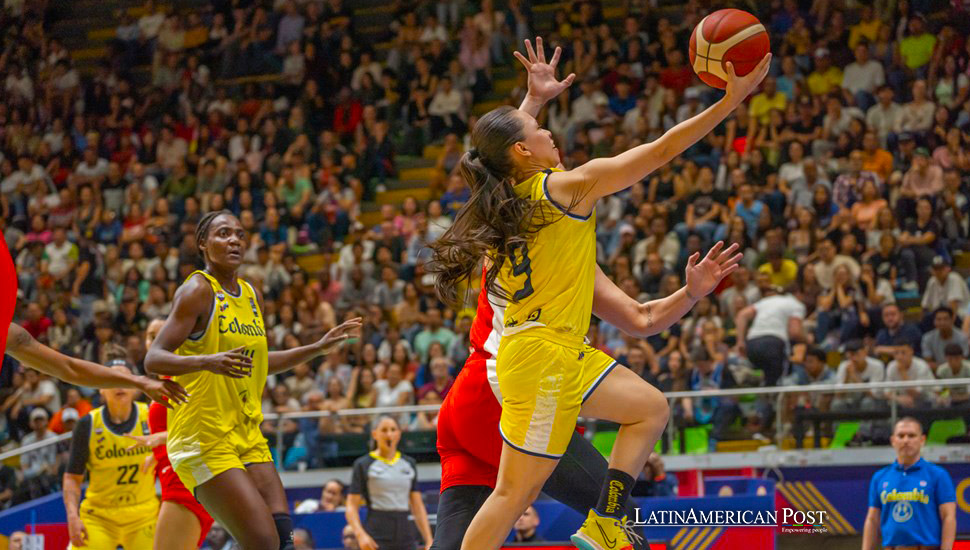Colombian Basketball Federation Battles Identity Theft in Russian Tournament Scandal

The Colombian Basketball Federation has announced legal action against a team falsely representing the Colombian national team in a Russian basketball tournament. The federation vehemently denies any official involvement and condemns its image and logo misuse.
In a surprising turn of events, the Colombian Basketball Federation was embroiled in a controversy when a team in Russia’s Friendship Cup tournament claimed to represent the Colombian national team. The federation has categorically denied any affiliation with the team, asserting that it did not grant permission or endorsement for any club to participate in the event held in the Russian city of Perm.
The federation’s statement highlighted the severity of the situation, emphasizing that it would pursue legal action for the “improper use of our image and logo.” The federation has been transparent that it never received a formal proposal to participate in the tournament, making the appearance of a team dressed in Colombia’s colors all the more shocking.
This incident has raised serious concerns about the integrity and management of international sports competitions, particularly in cases where teams falsely claim national representation. The federation’s swift response underscores its commitment to protecting the image and reputation of Colombian basketball on the global stage.
Russian Federation’s Defense and the Fallout
In response to the Colombian Basketball Federation’s accusations, Andrei Kirilenko, the president of the Russian Basketball Federation and a former NBA player, defended the Russian side’s actions. Kirilenko asserted that all communications with the team representing Colombia were conducted through official channels, and there was no intention to mislead or misrepresent the team’s identity.
“We would like to emphasize that all our interactions with the Colombian team took place exclusively through official communication channels,” Kirilenko told Match TV. He maintained that the Russian Federation’s position remains unchanged: all communications and coordination were conducted only through verified and official sources.
However, the situation quickly escalated when the team, donning Colombia’s colors, suffered two humiliating defeats—first, a 155-53 loss to a local Perm squad, followed by a 108-57 defeat at the hands of Venezuela. The poor performance led to the cancellation of a scheduled game against Russia, with Kirilenko expressing disappointment in the level of play displayed by the so-called Colombian team.
“After the first game, we understand that the current level of the Colombian team is lagging what was expected, which causes some disappointment for all of us,” Kirilenko stated. “In this regard, we have already revised the schedule and format of the tournament to ensure a more balanced and competitive competition.”
Implications for International Sports Governance
The controversy surrounding the unauthorized use of Colombia’s national basketball identity raises broader questions about governance and oversight in international sports. The incident highlights the potential risks associated with the lack of stringent verification processes regarding national representation in international competitions.
Many countries, particularly those with developing sports programs, need to maintain control over their national teams’ image and participation. Unauthorized participation tarnishes the national teams’ reputation and undermines the efforts of legitimate athletes and organizations working to elevate the sport.
The Colombian Basketball Federation’s decision to pursue legal action is a strong statement about protecting national identity in sports. It also serves as a warning to other sports organizations about the need for due diligence in verifying the legitimacy of teams claiming to represent a nation.
The Need for Stricter Controls and Accountability
This incident should serve as a wake-up call for international sports bodies to implement stricter controls and accountability measures. Ensuring that only officially recognized teams participate in international tournaments is not just a matter of protocol; it is essential for the integrity of the sport.
International sports federations must establish clear guidelines for verifying teams’ authenticity, including requiring formal documentation and direct communication with national governing bodies. These measures would help prevent incidents like the one involving the Colombian team in Russia and ensure that all participants in international competitions are legitimate representatives of their countries.
Moreover, this situation underscores the need for greater collaboration and communication between national federations and international sports organizations. By working together, they can develop more robust systems to prevent the misuse of national identities and protect the integrity of global sports.
Protecting National Pride in Sports
The Colombian Basketball Federation’s swift response to the unauthorized use of its image in Russia is a commendable effort to protect the country’s national pride in sports. However, this incident also highlights the ongoing challenges that smaller sports organizations face in maintaining control over their national teams on the global stage.
As the federation pursues legal action, this case is likely to set a precedent for how similar situations are handled in the future. The outcome could establish new protocols and safeguards within the international sports community, ensuring that only authorized representatives can compete under a nation’s flag.
In the meantime, the Colombian Basketball Federation must work to restore its reputation and ensure that the actions of an unauthorized group do not overshadow its legitimate athletes and teams. This will require ongoing vigilance and a commitment to upholding the highest standards of integrity in all aspects of the sport.
Also read: James Rodriguez: Searching for One Last Soccering Chapter
Ultimately, this incident serves as a reminder of the importance of national identity in sports and the need for all stakeholders—athletes, coaches, federations, and international bodies—to work together to protect and promote the true spirit of competition.





